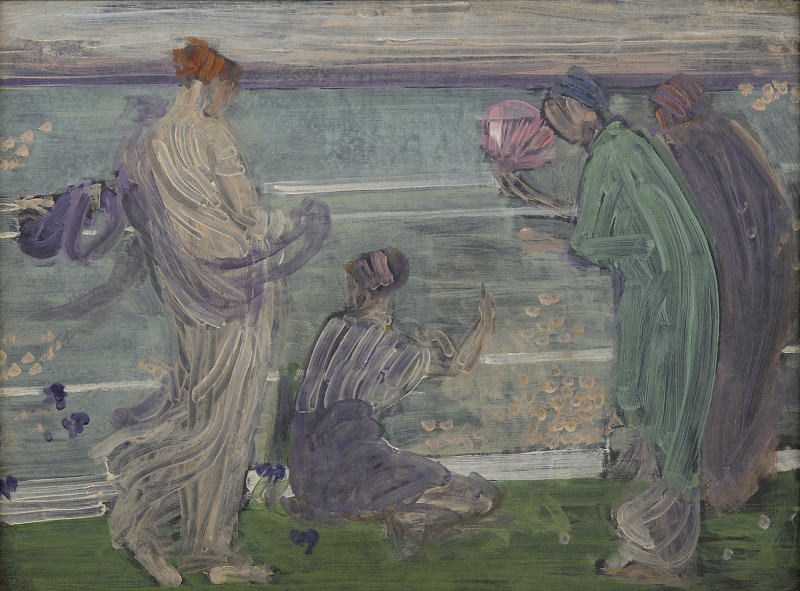Titles
Only one title has been suggested:
- 'Variations in Blue and Green' (1874, Flemish Gallery). 1
- 'Variations in Blue and Green' (1980, YMSM). 2
Description
Four women are on a balcony or promenade by the sea. One at left, in a white robe and lilac scarf, is facing right, and to right of her is a seated woman and two figures leaning over the railing and looking away out to sea.
Sitter
Not identified.
Comments
Japonisme:
Charles Lang Freer (1856-1919) noted that, 'The shore scene girls and sea, like Kiyonaga' was in Whistler's studio in London in 1902. 3

Kyonaga, A Party viewing the Moon on the Sumida River, right hand section of triptych, Boston Museum of Fine Art
The theme that runs through the 'Six Projects' is seen repeatedly in Japanese woodcuts, particularly those of Torrii Kiyonaga (1752-1815). His woodcuts appear to have provided a basis for Whistler's more explicitly Asian composition Variations in Flesh Colour and Green: The Balcony [YMSM 056]. Kiyonaga's diptych Cool of the Evening by the Sumida River (Series, Minami Juni-ko), an impression is reproduced above) is similar in the poses of the figures and setting, and could have been part of the inspiration both for this painting and Symphony in Blue and Pink [YMSM 086].
At some point either Whistler or his wife Beatrice Philip (Mrs E. W. Godwin, Mrs J. McN. Whistler) (1857-1896) acquired an impression, which was given to the British Museum by Beatrice's younger sister Rosalind Birnie Philip (1873-1958) in memory of her sister (British Museum Print Room, BM 1909-6-18-31).
Art for Art's Sake:
Algernon Charles Swinburne (1837-1909) may have been describing this painting, seen in Whistler's studio in 1868, when he wrote that of figures 'looking far oversea in that quiet depth of pleasure without words when spirit and sense are filled full of beautiful things, till it seems that at a mere breath the charmed vessels of pleasure would break or overflow, the brimming chalices of the senses would spill this wine of their delight.' As Prettejohn comments, 'The slight sketch thus becomes a figure for aesthetic contemplation.' 4
Last updated: 23rd November 2020 by Margaret






